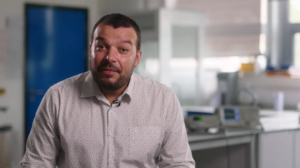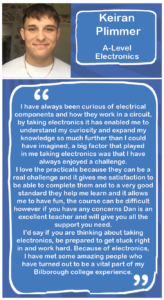Our Subject
CLICK IMAGE BELOW TO WATCH THE VIDEO

A Level Electronics FAQs

Taught by highly experienced staff, our A-level Electronics course has been running for over 25 years and achieves consistently great results. Your challenging, interesting classes are delivered in a bright laboratory equipped with an interactive whiteboard for delivery of lessons, and work stations for practical work, and a laptop for each student. You will become quite an expert at using computer-aided design (CAD) software to design and test your ideas. As well as Excel and Word and the internet, you will use specialist software to include Crocodile Clips, Livewire, and PIC Tutor. There are detailed interactive notes for all the topics on the Bilborough Sixth Form College Moodle. The course is very hands on and you will be designing and trying out circuits to deepen your understanding of the discipline.
To study Electronics at Bilborough, you will need to have a minimum of a grade 5 in GCSE Maths and a 4 in English Language. It is also highly desirable to have grade 4 in Double or triple Science.
Our links with HE
We’re always delighted when Electronics students from Bilborough Sixth Form College go on to study related degree subjects such as Engineering, Computing, Games Production and Music / Media – and indeed many of them do. Our tutors have good knowledge about higher education and are always happy to give you expert advice on suitable progression routes. Not only do students attend prestigious universities to study electronics, a large proportion of them find employment and apprenticeship opportunities.

